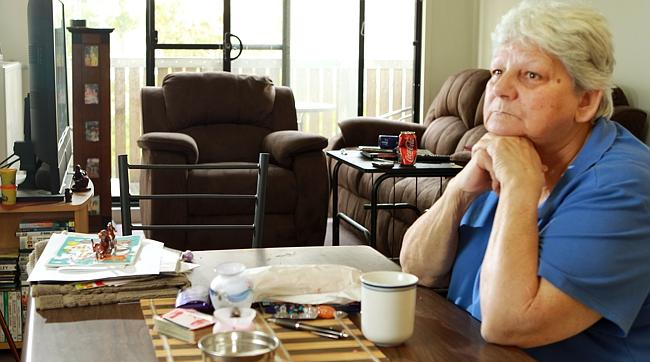Judul : Elderly Under Climate Threat: UN Report
link : Elderly Under Climate Threat: UN Report
Elderly Under Climate Threat: UN Report

Climate Change Poses Heightened Risks to Older Populations, Awakens Ancient Microbes
Extreme weather events, fueled by a changing climate, are increasingly endangering the lives of older individuals, while thawing permafrost and melting glaciers risk unleashing ancient microbes and long-dormant chemicals, according to a recent report. The report underscores the urgent need for proactive measures to protect vulnerable populations and mitigate the far-reaching consequences of environmental change.
Heatwaves and Vulnerable Populations
The report highlights a disturbing trend: heat-related deaths among older people have surged by an estimated 85% since the 1990s. This dramatic increase underscores the particular vulnerability of older individuals to the impacts of rising temperatures. Those with pre-existing chronic illnesses, limited mobility, or general frailty face a significantly heightened risk of developing heat-related health problems, including respiratory, cardiovascular, and metabolic diseases, ultimately leading to increased mortality.
Beyond heatwaves, the report also points to the dangers posed by deteriorating air quality and increased flooding, particularly in low-lying coastal cities where many older people reside. Air pollution and chemical contamination, such as pesticides, exacerbate the risk of cardiovascular and respiratory diseases, as well as neurodegenerative diseases, dementia, depression, and anxiety.
Strategies for Protection
Addressing these challenges requires a multi-faceted approach, focusing on creating more resilient and accessible urban environments. The report recommends prioritizing pollution-free cities with ample green spaces. Key strategies include:
- Improved Urban Planning: Designing cities with climate resilience in mind, incorporating features that mitigate heat and improve air quality.
- Community-Based Disaster Risk Management: Empowering local communities to prepare for and respond to extreme weather events, with a specific focus on the needs of older residents.
- Enhanced Access to Climate Information: Ensuring that older populations have access to timely and accurate information about climate risks and how to protect themselves.
The UN Human Rights Council's recent resolution to develop an "international legally binding instrument on the human rights of older persons" represents a significant step towards providing enhanced protection for this vulnerable demographic in the face of climate change.
The Cryosphere: A Melting Time Bomb
Beyond the immediate risks to human populations, the report also raises concerns about the potential consequences of a rapidly shrinking cryosphere. The cryosphere, encompassing glaciers, seasonal snow, ice sheets, sea ice, seasonally frozen ground, and permafrost, is highly sensitive to rising global temperatures. If temperatures rise more than 2°C above pre-industrial levels, the cryosphere will experience a significant reduction in mass, impacting the 670 million people who live in these regions and the billions more who rely on water originating from these frozen areas.
One of the most alarming consequences of thawing permafrost and melting glaciers is the potential reactivation and remobilization of ancient microorganisms. As temperatures rise, these previously frozen microbes could be released into the environment, with unpredictable consequences.
- Some may thrive, altering existing microbial communities.
- Others may not survive, leading to a loss of microbial diversity.
- Crucially, the release of these ancient microbes could enhance the potency of existing pathogens through natural gene transfers, potentially leading to a heightened risk of antimicrobial resistance (AMR).
Protecting the Cryosphere
To mitigate the risks associated with the shrinking cryosphere, the report recommends:
- Cutting Greenhouse Gas Emissions: Reducing emissions of greenhouse gases, including black carbon emissions from diesel engines, open-field agricultural burning, and wildfires, is crucial to slowing the rate of warming.
- Limiting Tourism in Fragile Frozen Regions: Restricting tourism in vulnerable areas can help minimize disturbance and protect the delicate ecosystems.
- Accelerating Scientific Research: Investing in research to understand the diversity of cryospheric microorganisms and the potential consequences of their release is essential.
Remobilization of Banned Chemicals and Aging Dams
The report also highlights the risks associated with the remobilization of chemicals that were banned and phased out decades ago. Flooding can bring these chemicals to the surface, where they have accumulated in sediment over centuries. As floodwaters stir up sediment and debris, these toxic chemicals can be released and re-enter urban areas or food systems.
Effective measures to reduce this growing risk include:
- Traditional flood control measures such as polders, dikes, and retention basins.
- Improved drainage systems.
- Nature-based solutions, such as sponge-city approaches.
- Regular monitoring of pollutants in diverse locations and products.
- Economic impact studies about this type of pollution.
Finally, the report addresses the risks posed by aging dams. While dams offer numerous benefits, they can also harm indigenous and fishing-dependent communities and degrade ecosystems. The removal of large, older dams that have become unsafe, obsolete, or economically unviable is increasingly common, especially in Europe and North America. The report emphasizes the potential benefits of dam removal in restoring natural river connectivity for biodiversity and ecosystems. Reversing river fragmentation and restoring natural processes supports the implementation of the UN's principles for ecosystem restoration initiatives. Engaging stakeholders, including Indigenous communities, and incorporating local knowledge and broader perspectives are key to facilitating decision-making and promoting restoration outcomes.
Thus the article Elderly Under Climate Threat: UN Report
You are now reading the article Elderly Under Climate Threat: UN Report with the link addresshttps://www.unionhotel.us/2025/07/elderly-under-climate-threat-un-report.html
0 Response to "Elderly Under Climate Threat: UN Report"
Post a Comment